Port Elizabeth Travel Guide
Officially called Gqeberha these days, Port Elizabeth (PE) lies at the end of the glorious Garden Route and offers a wealth of fantastic beaches, thrilling surf spots and superb water sports. The destination is also rich in marine wildlife such as dolphins and whales, and its locals are some of the friendliest people in the country.
Port Elizabeth was founded by shiploads of British settler families who arrived in the Eastern Cape in the early 19th century, hoping to improve their prospects after suffering economic hardship caused by the industrial revolution at home. The settlers came ashore at Algoa Bay, where there was nothing more than the small British Fort Frederick to welcome them. From these humble beginnings, the city has grown into a principal port and manufacturing centre.
It's very much a working town with a large portion of the population living in the outlying township areas, but Port Elizabeth draws plenty of tourists because of its proximity to the east coast's attractions, and the historically interesting interior. The city is wonderfully laidback and Algoa Bay boasts 25 miles (40km) of beautiful sandy beaches lapped by the warm waters of the Indian Ocean.
There are a few museums and a small oceanarium, as well as the Nelson Mandela Stadium, which was built for the 2010 World Cup and dominates the cityscape. The city centre has many heritage buildings that are worth visiting.
The nearby Donkin Reserve provides a pleasant day trip, as do Seaview Game and Lion Park and the Kragga Kamma Game Park. Slightly further afield, travellers can see the Big Five at Shamwari Game Reserve, Amakhala Game Reserve, and Addo Elephant Park.
Port Elizabeth is generally a transfer point for travellers, as opposed to a destination in itself, but the city is worth a day or two of exploration.
Things to do in Port Elizabeth
Though Port Elizabeth is the Eastern Cape's primary travel hub, its popularity with travellers is based on its proximity to some amazing national parks and historic sites, rather than to the charm of the place itself. Port Elizabeth is a little grubby and industrial but it does have a friendly, welcoming character and a lovely coastline.
The numerous worthwhile excursions out of the city far overshadow anything the urban area has to offer, and places such as Grahamstown, Nieu-Bethesda, and Jeffrey's Bay are big drawcards nearby. Port Elizabeth is also close to some world-class game reserves. However, the city itself does have some fun attractions, particularly for those travelling with children.
On a hill above the centre of the city stands a stone pyramid with an adjacent lighthouse. This open public space was proclaimed in perpetuity by Sir Rufane Donkin, acting British Governor of the Cape, when the 1820 Settlers arrived in Algoa Bay.
Donkin named the new settlement after his wife, Elizabeth, who had died in India two years previously, and erected the pyramid to her memory. The lighthouse was built in 1861, and today houses the city's Tourist Information Centre.
Maps are available from the centre describing a three-mile (5km) discovery trail through the hill area and central city, taking in 47 historic sites and architectural delights. This is the perfect place to start a spot of sightseeing in Port Elizabeth.
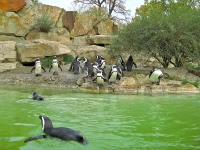
Bayworld
Port Elizabeth's most popular attraction consists of a complex on the beachfront that includes the Oceanarium, a museum, and a snake park. The Bayworld Oceanarium features an aquarium tank where visitors can watch a vast array of marine life through glass portholes as they glide by. This includes sharks, turtles, and rays. The penguins and seals are particularly entertaining while the snake park contains an impressive variety of indigenous reptiles in natural-looking enclosures. The PE Museum focuses on cultural and natural history with a wide variety of exhibits, from models of sailing ships and period costumes to giant replicas of dinosaurs that roamed the area in prehistoric times. It is the third-oldest museum in the country.
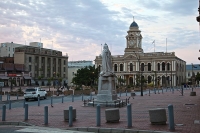
Market Square
Port Elizabeth's architectural heritage can be traced by taking a walk around the city's central Market Square, which features several historic buildings. The centrepiece of the square is the aesthetically pleasing City Hall, dating from 1858 and topped with an attractive clock tower. Also in the square is a replica of the Diaz Cross that commemorates the first European to set foot in Algoa Bay in 1488, when Portuguese explorer Bartholomew Diaz stopped over on his way east. Alongside the city hall is the Prester John Memorial, which is dedicated to the Portuguese explorers who landed in South Africa. On the northwest flank of the square is the city's public library. Built in 1835, it was originally used as a courthouse.
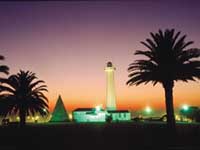
St George's Park
St George's Park has been a recreational centre for the city of Port Elizabeth for more than 150 years, boasting well-landscaped gardens covering 73 hectares. On site is the world famous Port Elizabeth Cricket Club, the second oldest cricket club in South Africa and the scene of many an exciting test match series, and the oldest bowling green in the country, established in 1884. The historic sporting venue was also the site of South Africa's first rugby test match. The love of cricket was brought to Port Elizabeth by British settlers and local myths tell of one of the settlers wading through the waters of Algoa Bay towards his new homeland with his cricket bat held safely above his head to keep it dry.
Addo Elephant Park
Addo Elephant Park is the most popular game reserve in the Port Elizabeth area, and is a 45-minute drive from the city. The park is situated in the ruggedly beautiful Eastern Cape region, and offers an authentic safari experience. Addo was founded in 1931 to save the area's remaining 11 indigenous elephants, and has been a remarkable success since then. It is now the third largest game reserve in South Africa, and one of the most popular with tourists and locals. The elephants are drawn to watering holes at certain times and sightings are virtually guaranteed all year round. There are other animals in the park too, including lion, leopard, black rhino, buffalo, zebra, warthog, hyena, and several types of buck.

Shamwari Game Reserve
The multi-award winning private game reserve of Shamwari lies less than an hour's drive from Port Elizabeth. It is responsible for re-introducing numerous species into the Eastern Cape plains, including all of the Big Five (lion, elephant, rhino, leopard, and buffalo). The reserve offers phenomenal luxury accommodation, but also hosts visitors on day trips from the city. Day tours include a visit to an art and culture village to sample Xhosa culture and traditionally brewed beer, and a trip to one of the Born Free centres for abused animals. There are two Born Free Big Cat Sanctuaries in Shamwari, where visitors can learn about how wildlife is abused in captivity and can see some of the rescued animals.
Grahamstown
The historic settler town of Grahamstown (or Makhanda as it was officially renamed in 2018) lies 78 miles (125km) northeast of Port Elizabeth. Many visitors become acquainted with its 1820 Settlers' National Monument. Sitting atop Gunfire Hill, the arts and theatre complex hosts the town's internationally recognised Arts Festival. Grahamstown was founded in 1812 as a garrison to drive the Xhosa people eastwards across the Fish River frontier, giving rise to a century of frontier war. The town has retained an English colonial flavour, and is home to the renowned Rhodes University and some top private boarding schools. Visitors will find several museums, including the JLB Smith Institute of Ichthyology, where two stuffed specimens of the coelacanth are on display. The town also boasts the only Victorian camera obscura in the southern hemisphere.
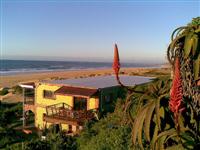
Jeffrey's Bay
Known colloquially as J-Bay, the surfing paradise of Jeffrey's Bay is a short drive west of Port Elizabeth. This determinedly laid-back seaside town is most famous for Supertubes, one of the best right-hand point breaks in the world. Many consider it South Africa's perfect wave. The town lives and breathes surfing and has several glorious surf spots that are gentler and more accommodating than the celebrated Supertubes. Dolphins, seals, and whales frequent the waters of J-Bay, and surfers are often lucky enough to mingle with these sea creatures. Long stretches of picturesque sandy beach surround the town and are renowned for their shells and bright orange aloes. Rivers and nature reserves border the town on both sides.
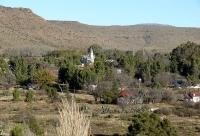
Nieu-Bethesda
Located about 32 miles (50km) from Graaff Reinet in the Karoo Heartland, Nieu-Bethesda is a tiny, sleepy place that seems to exist in blissful ignorance of modern life. Devoid of banks, paved roads, and even streetlights, Nieu-Bethesda nonetheless boasts several excellent and one-of-a-kind tourist attractions. The pick of these is the Owl House: a bizarre and unsettling sculpture garden created by reclusive artist Helen Martins. She was a frustrated visionary who suffered under the apartheid system and who took her own life in 1976. The Owl House is cluttered with cement and wire sculptures of a religious nature, painstakingly decorated with crushed glass, and gives a fascinating insight into a tortured and singular artistic personality.
Getting Around
Hiring a car is considered the best way to get around in Port Elizabeth, as the road system is good and traffic is light. Port Elizabeth is sometimes referred to as the '15-minute city' due to the ease of getting around. Municipal buses offer limited service around the city from the Market Square Bus Station.
Many locals get around in minibus taxis. However, these can be cramped and have high accident rates. Metered taxis are also available, but they are not frequently found on the street and must be booked by phone. Private transport services such as Uber also operate in the city.
Port Elizabeth Climate and Weather
Port Elizabeth enjoys a moderate, oceanic climate, and is known to have the most sunshine and fewest rainy days among South Africa's seaside cities. However, it is also sometimes known as 'the windy city', as the weather is not always idyllic.
Winters include mild, cool months, while summers are warm, remaining less hot than the northern parts of the east coast. In summer, between December and February, the average temperatures range between 64F (18C) and 77F (25C), and in winter, between June and August, they range between 48F (9C) and 68F (20C).
December and January are the most popular months for a holiday in Port Elizabeth, when the city comes alive with all sorts of fun-in-the-sun activities. The best time to visit, however, is just before or after the height of this season, when beaches are less crowded and the weather is just as good. Winters are very mild and those from northern climes will still find it warm enough to enjoy the sun. Winter is also a good time for game viewing in the many nearby reserves.
South Africa travel info
Electricity
The electrical current is 230 volts, 50Hz. Round, three-pin plugs and round, two-pin plugs are standard.
Language
South Africa has 11 official languages, including Afrikaans, English, Xhosa, Zulu, and Sotho. English is widely spoken.
Money
South Africa's currency is the Rand (ZAR), which is divided into 100 cents. Money can be exchanged at banks, bureaux de change, and the larger hotels. ATMs are widely available and major international credit cards are widely accepted. Visitors should be vigilant when drawing cash from ATMs, as con artists are known to operate there. All commercial banks will exchange foreign currency. hello
Tipping
Tips of at least 10 percent are expected for good service if a service charge is not included in the bill. Tipping for services rendered is widely anticipated by porters, taxi drivers and petrol attendants. Golf caddies should be tipped accordingly. 'Car guards' operate in the city centres and tourist spots and will offer to look after parked cars; they are usually immigrants from neighbouring countries looking for work and will expect anything from ZAR 8 upwards on the driver's return, depending on how long the driver will have been away.
Health
Travellers from areas infected by yellow fever must carry a vaccination certificate; otherwise no vaccinations are required. There is a malaria risk in the low-lying areas of the Northern Province and Mpumalanga (including the Kruger National Park), as well as northeastern KwaZulu-Natal, and precautions are advised when travelling to these areas, especially between October and May. Vaccinations are recommended for hepatitis A, hepatitis B and typhoid. Tap water is generally safe in urban areas but sterilisation is advisable elsewhere. Medical facilities in South Africa are good in urban areas, but medical insurance is strongly advised as private hospitals expect cash up front and public hospitals are best avoided. Medication is readily available in major cities, but those travelling outside of these centres for an extended period should bring a basic supply kit for emergency self-treatment.
Safety
It is worthwhile noting that the South African authorities give high priority to the protection of tourists and that, although crime rates are high, popular tourist sites and the main hotel areas tend to be safe. Still, travellers should remember that violent crime tends to be concentrated in pockets throughout the country and travellers should do some research to find out which areas to avoid. For instance, Berea and Hillbrow in Johannesburg are high-risk areas, and township areas in general are dangerous for foreigners.
There is a risk of petty, opportunistic crime in all urban areas and armed robberies are fairly common in Johannesburg. Travellers should always be aware of these risks and exercise the necessary precautions. Carjackings and smash-and-grab robberies are common in major cities. Doors should be locked when driving; bags and valuables should be kept out of sight. Travellers should not walk alone at night in any area, and should be vigilant when using ATMs. They should not display signs of wealth (mobile phones, money, expensive jewellery, cameras) on the streets. Credit card fraud is on the increase, meaning travellers should be vigilant and never allow their card out of their sight.
Nationwide power cuts (loadshedding) take place regularly, occurring many times a day for multiple-hour stretches. There is some risk that outages might interfere with telecommunications and security systems, hotels and other accommodations, as well as public lighting and traffic lights. Visitors can plan for power cuts by asking their accommodation provider how they mitigate loadshedding, and by checking planned power outages on the Eskom website or loadshedding apps. They can also carry a power bank with extra charging cables for electronic devices they need, and pack portable lighting such as torches.
Local customs
South African culture and etiquette in urban areas is very Western. While standards of dress vary, beachwear should generally not to be worn off the beach, and nude sunbathing is only permissible in a few designated areas. Homosexuality is legal and accepted in urban areas without much fuss, but is frowned on by some conservative South Africans and can be a problem in township areas. Although locals may complain loudly about the country and government, they will take offense if a foreigner is critical. Racism is a sensitive issue; however, interracial relationships are now common and widely accepted. South African racial terminology differs from what is acceptable in North America. The terms 'black' and 'white' are appropriate for those of African and Caucasian descent, respectively. 'Coloured' refers not to black Africans, but those of mixed African and European descent and is not considered an offensive term. South Africans are friendly and hospitable, and will often go out of their way to assist tourists who need help.
Doing business
Business practices in South Africa are influenced by South Africa's range of ethnicities, languages and even geographical areas, but in general follow common patterns. When doing business in South Africa it's important to be culturally sensitive and as understanding of colleagues' historical context as possible. Most South Africans prefer to do business with contacts they've met before, but they are also warm and open to newcomers. Working to build and maintain business relationships is vitally important in the South African business environment. South Africans are renowned for their friendliness, which generally supersedes business formality.
Most large corporations, as well as the banking and financial sector, still adopt relatively formal business practices, whereas other companies and work environments enjoy more relaxed and personable atmospheres. Clear management hierarchies and respect for senior executives and colleagues are of paramount importance. However, business exchanges and decision-making processes often take on an egalitarian aspect. As with most countries, punctuality is highly regarded, though government officials are notorious for their tardiness when it comes to keeping time. Dress codes tend to be conservative, but not overly formal. Suits are the exception more than the rule, but dressing stylishly will always count in a visitor's favour. It's best to dress formally for initial meetings.
South Africans value hard work and respect those who succeed, but are mindful of other aspects of life such as healthy living, family and nurturing relationships, all of which add up to a well-balanced life. Generally South Africans are regarded as relaxed and informal with regards to introductions and the handling of business cards. Shaking hands is common for both men and women. The giving of gifts is uncommon and unnecessary.
The official language of business in South Africa is English, and business hours tend to start at 8:30am or 9am and the day comes to a close at 5pm, or later in the major urban centres. Working over weekends tends to be quite rare in South Africa.
Duty free
Travellers to South Africa do not have to pay duty on 200 cigarettes, 20 cigars and 250g of tobacco; 2 litres wine and 1 litre spirits; perfume up to 50ml and 250ml eau de toilette; and other goods to the value of ZAR 5,000 per person.
Communications
The international access code for South Africa is +27. Mobile phone networks are available across the country, and there are roaming agreements with most international mobile operators. Mobile service providers offer very cheap 'pay-as-you-go' SIM cards, which are a good option for visitors staying for some time. Alternatively, travellers can use eSIMs if their cellular providers support it on their networks. WiFi is easily available, especially in the larger cities.
Passport & Visa
Passports should be valid for at least 30 days beyond the period of intended stay. An onward or return ticket is required, as is evidence of sufficient funds. Extension of stay for an additional 90 days is possible if travellers apply at least 60 days prior to the expiry date of their visa, permit or visa exempt period. There are special requirements for travelling to South Africa with children under the age of 18, and different requirements for unaccompanied children entering the country. Travellers should consult the nearest South African high commission or embassy for details. It is highly recommended that travellers' passport have at least six months' validity remaining after the intended date of departure from their travel destination. Immigration officials often apply different rules to those stated by travel agents and official sources.
Entry requirements
United States nationals need a passport valid for at least 30 days beyond intended travel. A visa is not required for stays of 90 days.
UK nationals need a passport valid for 30 days beyond the date of intended travel, but no visa is needed for stays of up to 90 days.
Canadian nationals need a passport valid for 30 days beyond the date of intended travel, but no visa is needed for stays of up to 90 days.
Australian nationals need a passport valid for 30 days beyond the date of intended travel, but no visa is needed for stays of up to 90 days.
Irish nationals require a passport valid for 30 days beyond intended travel, but no visa is needed for stays of up to 90 days.
New Zealand nationals require a passport valid for 30 days beyond intended travel. A visa is not required for stays of up to 90 days.
Useful contacts
South African Tourism, Johannesburg: www.southafrica.net
Emergencies: 10111 (Police), 10177 (Ambulance), 10112 (cellphone emergency number).Embassies / consulates in other countries
South African Embassy, Washington, United States: +1 202 232 4400.
South African High Commission, London, United Kingdom: +44 20 7451 7299.
South African High Commission, Ottawa, Canada: +1 613 744 0330.
South African High Commission, Canberra, Australia (also responsible for New Zealand): +61 2 6272 7300.
South African Embassy, Dublin, Ireland: +353 1 661 5553.
Embassies / consulates in South Africa
United States Embassy, Pretoria: +27 12 431 4000.
British High Commission, Pretoria: +27 12 421 7500.
Canadian High Commission, Pretoria: +27 12 422 3000.
Australian High Commission, Pretoria: +27 12 423 6000.
Irish Embassy, Pretoria: +27 12 452 1000.
New Zealand High Commission, Pretoria: +27 12 435 9000.



